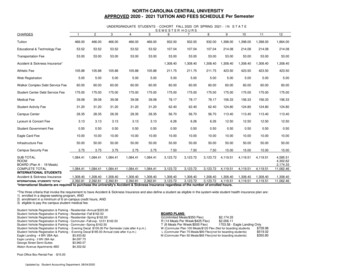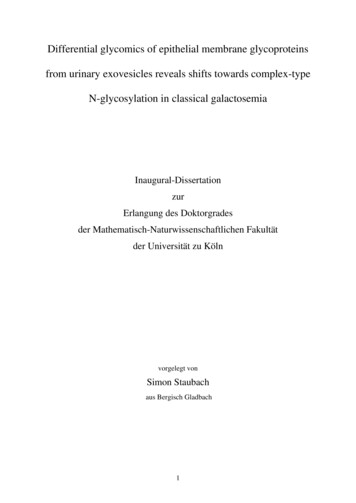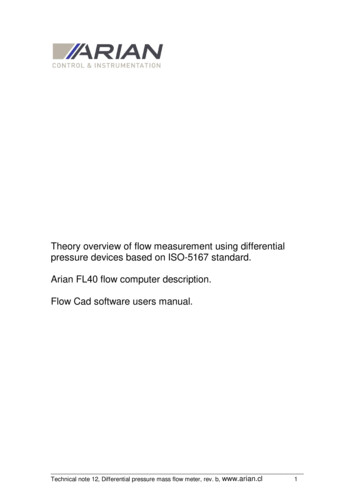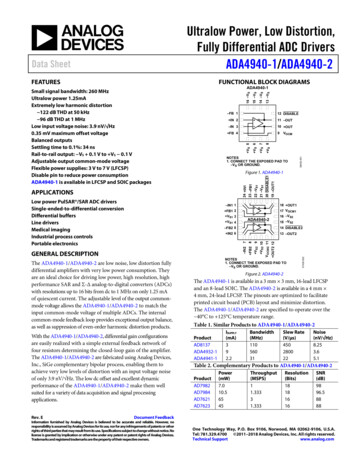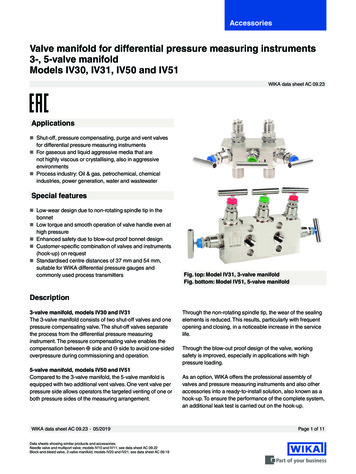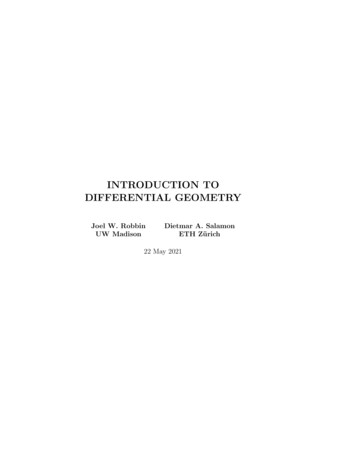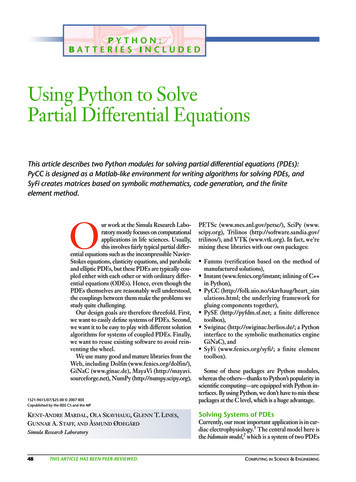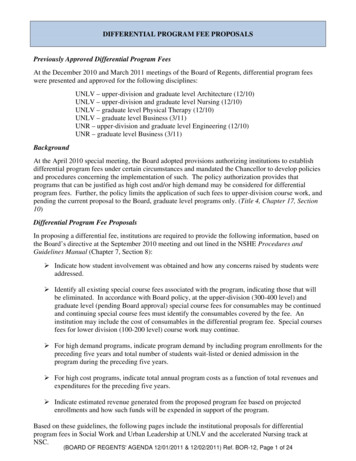
Transcription
DIFFERENTIAL PROGRAM FEE PROPOSALSPreviously Approved Differential Program FeesAt the December 2010 and March 2011 meetings of the Board of Regents, differential program feeswere presented and approved for the following disciplines:UNLV – upper-division and graduate level Architecture (12/10)UNLV – upper-division and graduate level Nursing (12/10)UNLV – graduate level Physical Therapy (12/10)UNLV – graduate level Business (3/11)UNR – upper-division and graduate level Engineering (12/10)UNR – graduate level Business (3/11)BackgroundAt the April 2010 special meeting, the Board adopted provisions authorizing institutions to establishdifferential program fees under certain circumstances and mandated the Chancellor to develop policiesand procedures concerning the implementation of such. The policy authorization provides thatprograms that can be justified as high cost and/or high demand may be considered for differentialprogram fees. Further, the policy limits the application of such fees to upper-division course work, andpending the current proposal to the Board, graduate level programs only. (Title 4, Chapter 17, Section10)Differential Program Fee ProposalsIn proposing a differential fee, institutions are required to provide the following information, based onthe Board’s directive at the September 2010 meeting and out lined in the NSHE Procedures andGuidelines Manual (Chapter 7, Section 8):¾ Indicate how student involvement was obtained and how any concerns raised by students wereaddressed.¾ Identify all existing special course fees associated with the program, indicating those that willbe eliminated. In accordance with Board policy, at the upper-division (300-400 level) andgraduate level (pending Board approval) special course fees for consumables may be continuedand continuing special course fees must identify the consumables covered by the fee. Aninstitution may include the cost of consumables in the differential program fee. Special coursesfees for lower division (100-200 level) course work may continue.¾ For high demand programs, indicate program demand by including program enrollments for thepreceding five years and total number of students wait-listed or denied admission in theprogram during the preceding five years.¾ For high cost programs, indicate total annual program costs as a function of total revenues andexpenditures for the preceding five years.¾ Indicate estimated revenue generated from the proposed program fee based on projectedenrollments and how such funds will be expended in support of the program.Based on these guidelines, the following pages include the institutional proposals for differentialprogram fees in Social Work and Urban Leadership at UNLV and the accelerated Nursing track atNSC.(BOARD OF REGENTS' AGENDA 12/01/2011 & 12/02/2011) Ref. BOR-12, Page 1 of 24
UNLVSocial Work(BOARD OF REGENTS' AGENDA 12/01/2011 & 12/02/2011) Ref. BOR-12, Page 2 of 24
UNIVERSITY OF NEVADA, LAS VEGASDIFFERENTIAL FEE PROPOSAL FOR UNLV MASTERS OF SOCIAL WORK PROGRAMResponse to Specific Board Policy Questions:1. Student Involvement:In the fall 2011 semester the School of Social Work sought input from students concerning thedifferential fee proposal for the Masters of Social Work program in light of a new fee structureproposal. On September 21, 2011 the Graduate Program Coordinator had a Brown Bag LunchProgram with students to discuss the differential fee proposal. The major concern expressed inthis meeting centered on the impact that the fee might have on financial aid. The School alsoposted an announcement on its website explaining the differential fee proposal and seekingcomments. To date, the School has received little feedbackIn April of 2011 students were asked via email to provide responses to the differential fee proposalfor the Masters of Social Work program. This was the first student input and 15 responses werereceived. Although none of the students wanted to see an increase in fees, most understood thatdifferential fees are being proposed as an alternative to possible program elimination. Themajority of students stated that they would support the minimum possible amount of differentialfees if it meant keeping the Masters of Social Work program. Some students expressed concernthat the program may still be eliminated at some point even if differential fees were charged.2. Special Course Fees.Listed below is information on the current courses fees for all courses impacted by differentialfees, along with the proposed adjustments to assure that all remaining course fees are forconsumables only. Please note there are no campus/President approved course fees for thisprogram ( 50). All fees were reviewed as part of this analysis to assure that the only feesremaining would be for items consumed during the course of the semester by students.CourseSW 7005A ‐ Field Practicum ‐ Forensic Social WorkSW 719 ‐ Foundation Practice Internship ISW 729 ‐ Foundation Practicum IISW 739 ‐ Field Practicum I (DP)SW 749 ‐ Field Practicum II (DP)SW 759 ‐ Field Practicum I (MCP)SW 769 ‐ Field Practicum II 10210New/FinalCourse Fee15151515151515Fees Effective January 1, 2012The course fees remaining for the Masters of Social Work program will cover travel for off‐sitepracticums.(BOARD OF REGENTS' AGENDA 12/01/2011 & 12/02/2011) Ref. BOR-12, Page 3 of 24
The changes to the Board manual to implement these fee changes are noted below, which wouldresult in only fees for course consumables remaining.P&G Manual, Chapter 9, Section 9.1. Special Course FeesFee changes effective Fall 2012. Existing fees remain in effect until that time.1. University of Nevada, Las VegasSW 7005A, Field Practicum‐Forensic Social Work 225.00/course 15.00/courseSW 719, Foundation Practicum Internship ISW 729, Foundation Practicum II 225/course 15.00/course 225/courseEffective Spring 2011 15.00/courseSW 739, Field Practicum I (DP) 225/course 15.00/courseSW 749, Field Practicum II (DP) 225/courseEffective Spring 2011 15.00/courseSW 759, Field Practicum I (MCP) 225/course 15.00/courseSW 769, Field Practicum II (MCP) 225/courseEffective Spring 2011 15.00/course3. High Demand Programs.Master of Social WorkProgram EnrollmentsAnnual FTEStandingMastersFY 2006FY 2007FY 2008FY 2009FY 2010FY 201149.5606472.865.262(BOARD OF REGENTS' AGENDA 12/01/2011 & 12/02/2011) Ref. BOR-12, Page 4 of 24
Student AdmissionsApplicants177171181205196FY 2006FY 2007FY2008FY 2009FY 2010Wait Listed00000DeniedAdmission4953468674% DeniedAdmission27.7%28.7%27.1%23.9%25.0%Masters of Social Work Program Demand:The Masters of Social Work is a high demand program. The graduate program receives close to200 applications each year with an acceptance rate of 71‐76 %. Program enrollments could beincreased significantly if we had sufficient resources to accommodate demand. However, wecannot do so given the possibility of eliminating 4‐5 faculty lines as currently proposed, unlessdifferential fees are approved by the Board. UNLV has one of the lowest graduate tuition in theregion ( 14,370) for a similar program, as evidenced by the following table. By allowing us tomove toward a tuition rate of 460‐480 per credit hour, which includes both the per credit fee andthe differential fee, it would bring us into the mid‐range of social work graduate tuition/fees in thewestern region. It is the only program in southern Nevada that provides both the undergraduateand graduate level degrees which lead to social work licensure. It should be noted that 34% of thestudents who entered our Master of Social Work’s program this fall were from out of state.Differential tuition would also allow us to explore offering an online MSW at a rate much lowerthan for‐profit, private institutions, and opening up the program to an even wider market. Thereare a growing number of accredited programs (Florida State, University of New England andUniversity of Southern California) that do offer an online MSW, each with remarkable enrollmentgrowth.SchoolTermFT Total CostArizona StateSemester 17,696UC BerkeleySemester16,948Quarter17,777Colorado StateSemester14,446Portland StateSemester9,356Quarter29,040U. Southern CaliforniaSemester41,120University of DenverSemester29,628UCLALoma Linda(BOARD OF REGENTS' AGENDA 12/01/2011 & 12/02/2011) Ref. BOR-12, Page 5 of 24
SchoolTermFT Total CostUniversity of WashingtonSemester29,628Brigham YoungSemester33,480University of UtahSemester10,286Washington UniversitySemester32,760University of Nevada‐currentSemester14,370University of Nevada‐proposedSemester22,5894. High Cost Programs.The information below as of FY 2010 compares the average cost per FTE student for thedifferential fee program to the projected average cost per FTE student for the entire institution.ProgramAverage Cost per AAFTEInstitutional Average 11,833Master of Social Work 16,504Program Cost Rank at UNLV8th out of 62Master of Social Work5 Year Budget ionProgram Costs Fund Costs(3)(1), (2)FY 07FY 08FY 09FY 10FY 51,374,962StateGeneralFundPortion ofRegistration 6,146217,741151,472227,208217,741189,340Total StatePro‐RatedGeneral Fund 751,374,962% of Total GFof TotalRevenue75.0%79.6%74.3%72.9%73.4%Accounts for Programs were identified by the Provost Office and the Budget Office Gathered Expense Data for the identified accounts from AdvantageInstruction Program Cost is for Graduate Costs in the Masteers of Social Work program onlyThe is a per AFTE calculation using the department's AFTE to appropriate the non‐instructional functions to the department's expenses.(BOARD OF REGENTS' AGENDA 12/01/2011 & 12/02/2011) Ref. BOR-12, Page 6 of 24
5. Projected Revenues and Expenditures.Summary of Projected Annual Revenue from Differential FeesMaster of Social WorkProjected 5DistributionDepartment/ProgramFinancial Aid Course Fee366,97672,20942,210Total481,395Summary of use of Program funds noted above:Social Work: MSW DegreeFinancial Aid 72,209Offset to Course Fees42,210Operating Dollars6,0003‐4 FTE Faculty Lines including one FIRS360,976Total 481,395Distribution of Fees and Tuition ‐ Differential FeesUNLV School of Social WorkThe following fee distribution for the University of Nevada, Master of Social Work designatedcourses (based on the course designator noted below) has been approved by the Board ofRegents:Fees Effective Fall 2012GraduateMaster of Social Work (SW)Graduate Financial AidNon‐Consumable Course Fee OffsetProgram direct revenue15% of Diff Fee9% of Diff Fee76% of Diff FeeWUE Student: Would pay 1.5 times the differential fee increment.Good Neighbor: Would pay the full differential fee rate, in addition to the Good Neighbor rateDistance Ed Rates: Would reflect the same differential fee increment.(BOARD OF REGENTS' AGENDA 12/01/2011 & 12/02/2011) Ref. BOR-12, Page 7 of 24
6. Proposed Fee.DIFFERENTIAL FEE LEVELS EFFECTIVE FALL 2012 ACADEMIC YEAR AND SUMMER 2013:DIFFERENTIAL FEE INCREMENT IN ADDITION TO REGISTRATION FEESThe differential fee rates for these three programs will remain as noted below unless changes areapproved by the Board (for Academic Year and Summer Terms). The differential fees will apply tocourses with designators as noted below:Fees Effective Fall 2012.DisciplineSocial WorkCourse Pre‐FixSWCourse Level700Amount (per credit hour) 125.00(BOARD OF REGENTS' AGENDA 12/01/2011 & 12/02/2011) Ref. BOR-12, Page 8 of 24
UNLVUrban Leadership(BOARD OF REGENTS' AGENDA 12/01/2011 & 12/02/2011) Ref. BOR-12, Page 9 of 24
UNIVERSITY OF NEVADA, LAS VEGASDIFFERENTIAL FEE PROPOSAL FOR UNLV MASTERS OF ARTS IN URBAN LEADERSHIP PROGRAMThe Masters of Arts in Urban Leadership is a redesign of a PK‐12 leadership concentration in anapproved M.Ed. in education leadership that was housed in the former Department ofEducational Leadership. The Board, at the September 2011 meeting, approved this programchange. This redesigned program is now housed in the Greenspun College of Urban Affairs. Itretained those elements necessary for state certification for education administrators, butaddresses leadership standards in a broader way, capturing the expertise in publicadministration, community engagement, communication, and marketing/media offered in theSchool of Environmental and Public Affairs. This degree addresses national educational reformdirectives calling for school leaders to be more broadly prepared; to be able to "lead acrossboundaries" as community leaders.Response to Specific Board Policy Questions:1. Student Involvement:Thirty‐five graduate students were asked during the Spring 2011 semester if they would be lesslikely to enroll in the Urban Leadership program if differential tuition were charged. To aperson they all said the higher tuition charges would not stop them from enrolling, especiallysince the existing UNLV tuition was so low by comparison to other competing higher educationinstitutions and because they felt the quality of the education being offered would be worththe extra money.The Department of Educational Leadership was eliminated during Academic Year 2010‐11.With the uncertainty of what would happen to the program, the portal for new graduatestudent admission was closed. There are no new students to seek additional input from. Theinformation from Spring 2011 is the most relevant information.2. Special Course Fees.Listed below is information on the current courses fees for all courses impacted by differentialfees, along with the proposed adjustments to assure that all remaining course fees are forconsumables only. Please note there are no campus/President approved courses ( 50). Allfees were reviewed as part of this analysis to assure that the only fees remaining would be foritems consumed during the course of the semester by students.EDA 790InternshipBoardApproved 400CampusApproved0Non‐ConsumablesPortion 400New/FinalCourse Fee0(BOARD OF REGENTS' AGENDA 12/01/2011 & 12/02/2011) Ref. BOR-12, Page 10 of 24
The changes to the Board manual to implement these fee changes are noted below, whichwould result in no special course fees for this program.P&G Manual, Chapter 7, Section 9.1. Special Course FeesFee changes effective Fall 2012. Existing fees remain in effect until that time.1. University of Nevada, Las Vegas 400.00/courseEDA 790, Internship3. High Demand Programs.Educational Leadership PK‐12 * Note: this is a master’s level program only, and that is theinformation noted below.Program EnrollmentsAnnual FTEStandingFY 2006FY 2007FY 2008FY 2009FY 2010FY 20111101151181069165MastersStudent 16* Educational Leadership PK‐12 Program was transferred to the Greenspun College of UrbanAffairs and was approved by the Board as a new program, Urban Leadership, at the September2011 Board Meeting. In addition, this program had come under consideration through programelimination and its enrollment in FY 2011 reflects this uncertainty on the part of students. FY2011 Enrollments in particular were low because of the uncertainly of the future of theprogram.Masters of Art in Urban Leadership Program Demand:Several select institutions offer programs focused specifically on urban school leaders, but fewof those institutions have developed a program that integrates leadership preparation formultiple social institutions in an urban setting.(BOARD OF REGENTS' AGENDA 12/01/2011 & 12/02/2011) Ref. BOR-12, Page 11 of 24
Although the rapid population growth has slowed in southern Nevada, it has not stopped; ClarkCounty School District (CCSD) recognizes the need to prepare new community leaders. We areworking with CCSD on the development of a system where a cohort of students selected by thedistrict would enter the program each year. That population would be independent from thenatural interests among individuals seeking a career change or career advancement.Additionally, the retirement of the Baby Boom generation, typically the most experiencedleaders in communities, means that employment opportunities will exist for high qualityleaders.Our enrollment projections are consistent with programs nationally.As illustrated in the information below, the Masters of Art in Urban Leadership program,including the new differential fee is quite competitive. Currently this Masters program at UNLVis significantly lower than the program costs of the local competition (Phoenix and NovaSoutheastern)UniversityIn-State Program CostsArizona State UniversityUniversity of ArizonaUCLAUniversity of UtahUniversity of VirginiaColorado State UniversityPortland State UniversityPhoenix UniversityNova SoutheasternUNLV CurrentUNLV 23,35225,02010,56216,8624. High Cost Programs.The information below compares the projected average cost per FTE student for the Masters ofArt in Urban Leadership program to the projected average cost per FTE student for the entireinstitution (FY 2010 data used for this analysis).ProgramAverage Cost per AAFTEInstitutional Average 11,833Master of PK‐12Educational Leadership 19,109Program Cost Rank at UNLV5th out of 62(BOARD OF REGENTS' AGENDA 12/01/2011 & 12/02/2011) Ref. BOR-12, Page 12 of 24
Master of Educational Leadership PK‐12The data below is from College of Education. This program was transferred to Urban Leadershipand is now called the Masters of Arts in Urban Leadership.5 Year Budget HistoryNon‐InstructionPro‐RatedInstruction GeneralFund CostsProgramCosts (1), (2) (3)FY 07FY 08FY 09FY 10FY 4,3431,969,705StateGeneralFundPortion ofRegistration 761,657,943Total StateSupportedRevenue% of TotalGF of 969,70588.0%87.4%86.3%85.6%84.2%Accounts for Programs were identified by the Provost Office and the Budget Office Gathered Expense Data for theidentified accounts from AdvantageInstruction Program Cost is for Graduate Costs in the PK‐12 Educational Administration Program OnlyThe is a per AFTE calculation using the department's AFTE to appropriate the non‐instructional functions tothe department's expenses.* As noted above, this program has been transferred to the Greenspun College of Urban Affairsand the new name of Urban Leadership was approved by the Board at the September 2011Board of Regent’s meeting.5. Projected Revenues and Expenditures.Summary of Projected Annual Revenue from Differential FeesProjected RevenueMasters of Art inUrban partment/Course FeeTotal9,025292,500Summary of use of Program funds noted above:Urban LeadershipFinancial AidOffset to Course FeesOperating Dollars2‐3 Faculty Lines 43,8759,0254,600235,000Total 292,500(BOARD OF REGENTS' AGENDA 12/01/2011 & 12/02/2011) Ref. BOR-12, Page 13 of 24
Distribution of Fees and Tuition ‐ Differential FeesMasters of Arts in Urban LeadershipThe following fee distribution for the University of Nevada, Masters of Arts in Urban Leadershipdesignated courses (based on the course designator noted below) has been approved by theBoard of Regents:Fees Effective Fall 2012Masters of Arts in Urban LeadershipGraduate Financial AidNon‐Consumable Course Fee OffsetProgram direct revenueGraduate15% of Diff F
differential fee program to the projected average cost per FTE student for the entire institution. Program Average Cost per AAFTE Program Cost Rank at UNLV Institutional Average 11,833 Master of Social Work 16
